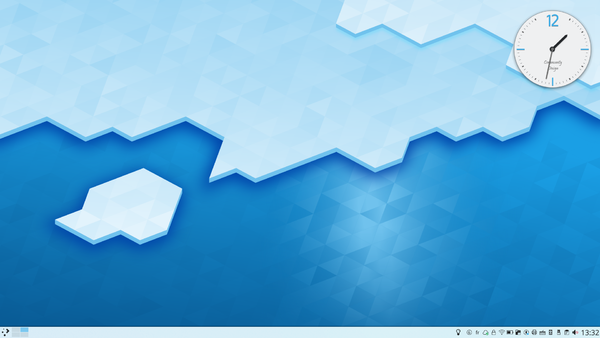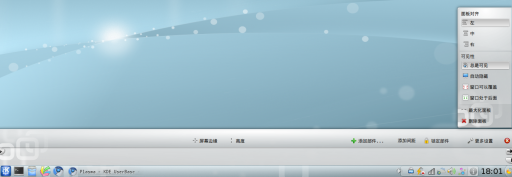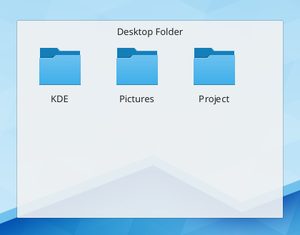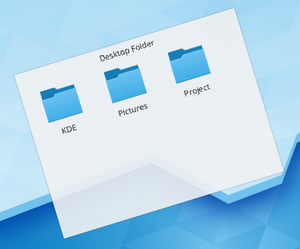Plasma/zh-cn: Difference between revisions
m (Created page with '开始菜单等。') |
(Updating to match new version of source page) |
||
| (154 intermediate revisions by 4 users not shown) | |||
| Line 1: | Line 1: | ||
<languages /> | <languages /> | ||
== | == 一览 == | ||
Plasma是KDE软件的工作空间。Plasma实际上是一种能够适应多种设备的技术, 目前有两个变种: 我们大多数页面的关注点Plasma Desktop, 以及用于平板电脑和手机的新桌面环境Plasma Mobile. Plasma Netbook环境在KDE Plasma5被应用仪表板菜单取代。 | |||
典型的 Plasma 桌面环境看起来像这样: | |||
[[File:Plasma_Desktop.png|600px|center]] | |||
默认的 Plasma 桌面有4个关键组成部分: | |||
* '''[[Special:myLanguage/Plasma/Panels|面板]]''',此部分有时被称为“任务栏”,为程序启动器、任务(程序)列表、时钟和系统托盘提供空间; | |||
* '''桌面''',小部件和图标的摆放区域; | |||
* '''[[Special:myLanguage/Plasma#Folder_Views|文件夹视图]]''',列出电脑某个文件夹内容的桌面部件,用于快速进行基本的文件管理操作; | |||
* '''Plasma 工具箱''',位于屏幕左上角,面板右侧也有一个。用于快速访问设置选项。 | |||
以上所有预设均可被更改, 且可放置多种工具和内容。 | |||
=== | === Plasma 桌面环境常见问答 === | ||
敬请移步至[[Special:MyLanguage/Plasma/FAQ/Index|Plasma 常见问题索引]]页面,里面对 Plasma 桌面环境当前版本的常见问题做了简要的解答,里面还有指向老版本常见问题的链接。 | |||
Plasma | === 开始使用 Plasma === | ||
你可以像使用其他任何操作系统的桌面环境那样使用 Plasma,如访问[[Special:myLanguage/Plasma/Kickoff|程序启动器]],查看[[Special:myLanguage/Plasma/Tasks|任务栏]]上当前运行的程序,访问系统托盘上的图标等等。 | |||
Plasma 一个重要的部分是「部件」。部件是桌面上独立的单元(individual units),它们包括但不限于程序菜单,图标,系统托盘,时钟等。部件可以直接放置在桌面,也可插入到面板或屏幕保护中,或是部件板上以及其它地方。部件非常之多,除了常规的桌面帮助,还包括微博客(Twitter,identi.ca)、单位换算器、天气预报、文件共享等。面板和桌面自身也是特殊类型的部件,能够容纳其它部件。 | |||
那个怎么跟桌面使用联系起来哪?Plasma 有一些就传统桌面使用的新特性。我们之前已经提到了 Plasma 工具箱(toolboxes):那些就是与Plasma交互,自定义你的 Plasma 桌面的方式。点击它们,屏幕会弹出一个带多种选项的菜单:在那你可以添加部件到面板或桌面上,缩放、添加/删除面板,更改桌面壁纸和其他操作。 | |||
<span id="Folder_Views"></span> | |||
=== 文件夹视图 === | |||
如你从前面截图中注意到的,桌面上没有直接放置图标。取而代之的是,它们被放置在一个容器内,该容器叫做"文件夹视图"。默认情况下,「文件夹视图」显示的是「桌面(Desktop)」文件夹的内容,「文件夹视图」允许你拖动文件到其中,打开它们,剪切,复制,粘贴,重命名文件并且也能创建新文件夹/文件。 | |||
你可以拥有多个文件夹视图在桌面上,它们还可以放置到面板上。你可以设定不同文件夹视图显示不同文件夹的内容,本地或是能访问的远程文件夹皆可。每个文件夹视图可以随心所欲的单独移动和缩放。 | |||
文件夹视图也可以设置成默认的全屏桌面背景,这样一来,更像是传统的「图标散落在桌面」布局。 | |||
=== | === 面板 === | ||
[[Image:ZhcnPanel_Settings.png|512px|center]] | |||
面板允许你在屏幕边缘摆放部件。这些部件可高度调整,包括设定成在其未使用时自动隐藏或对齐到屏幕某个位置。 | |||
默认情况下,只有一个面板在屏幕底部,但你可以添加、移动、删除以及定义默认面板。所有面板中的部件也可以根据喜好调整。 | |||
要获取更多有关设定 Plasma 桌面面板的信息以及了解面板的潜力,阅读 [[Special:myLanguage/Plasma/Panels|Plasma 面板]] 页面。 | |||
[[Special:myLanguage/LatteDock|Latte Dock]] 是一个面板的备选 | |||
=== 小部件 === | |||
[[Image:Plasma_Widget_Explorer.png|thumb|512px|center|Plasma 部件浏览器]] | |||
Plasma不但支持Plasma专属的部件(这类部件也叫做Plasmoid),而且支持其他来源的部件,比如Google Gadgets、Superkaramba 和 Mac OSX 的某些 Dashboard Widgets。额外的部件可以轻易的通过[[Special:myLanguage/Glossary#Get Hot New Stuff|获得百宝箱]]找到并安装。 | |||
要使用安装好的部件,需要打开部件管理器。将其打开的方式有如下几种 | |||
* 点击屏幕右上角的桌面工具箱,选择 <menuchoice>添加部件</menuchoice>; | |||
* 面板右侧的面板工具箱,同上; | |||
* 右击桌面,同上。 | |||
添加部件,只需将其从部件浏览器拖动到到桌面。如果需要将其放到面板上,打开边缘的面板工具箱,再打开部件浏览器(点击<menuchoice>添加部件</menuchoice>),拖动到相应位置。 | |||
= | {{Note/zh-cn|1=当部件被锁定时不能添加部件。打开桌面工具箱、面板设置或是右击桌面,然后选择 <menuchoice>解锁部件</menuchoice>。 | ||
<br /> | |||
添加完部件后,你可以重复之前的步骤,选择 <menuchoice>锁定部件</menuchoice>。}} | |||
停靠在面板中的部件通常都有选项菜单,桌面上的部件在'把柄(handle)'上有配置选项。把柄是悬停鼠标到部件上便会弹出的灰色区域,点按住把柄空余部分允许你拖动部件到理想的位置。 | |||
[[Image:Handle-new.png|300px|center]] | |||
在把柄上有四个工具。顶部是缩放。点击并拖动这个工具来放大和缩小该部件。 | |||
第二个工具是旋转工具。同样的,点击并按住它,旋转到理想的角度。 | |||
[[Image:Handle-new-rotate.png|300px|center]] | |||
第三个是手柄,其允许你设置当前这个部件的选项。 | |||
第四个工具是"扩展视图(expanded view)",其只在支持该特性的部件上出现,比如「照片相框」或「Web 浏览器」。举例来说,点击后,「照片相框」便会用图片浏览器打开当前图片,同样的操作换成「网页快讯」部件,便会用 Web 浏览器窗口打开网页。 | |||
== | [[Special:myLanguage/Category:Widgets|这里]]有列出各式 Plasma 部件,同时拥有各自的页面条目,一些我们喜爱的部件在''[[Special:myLanguage/Plasma/Plasmoids|Plasma 部件页面]]''有所讨论。 | ||
<span id="Activities"></span> | |||
==活动== | |||
The icons shown in the screenshot have small buttons in the top right and bottom right. The small pause button in the top right prevents the activity from being included when switching through Activities using <keycap>Super + Tab</keycap>. It also opens up an "x" to delete the activity. To change the names of the activities, look for the small wrench in the bottom right of the icon. | |||
= | <div class="mw-translate-fuzzy"> | ||
[[Image:Plasma_Activity_Explorer.png|thumb|512px|center|Plasma 活动浏览器]] | |||
</div> | |||
=== 用例 === | |||
一个用户喜欢网页连环画'''(好幼稚...)''',所以他用「连环画部件」添加了他最爱的网页连环画。这个用户现在有了一个专门用来放他最爱的网页连环画的完整的桌面活动。现在这个用户有了网页连环画很开心,但这用户现在又不得不去工作,因此这个用户创建了一个带「文件夹视图部件」的活动,「文件夹视图部件」被设定到这个用户当前工作的项目文件夹。工作结束后,这用户继续一个业余项目:写爱情小说'''(写的是H小说吧)'''。这用户总是在注视他某个重要的人的照片时获得灵感'''(这就是意淫)'''。现在用户创建了一个新活动,但不同的是他摆放了显示他重要的那个人照片的「照片框架部件」。用户也有一个显示爱情小说项目文件夹的「文件夹视图部件」。现在不管这个用户在做什么,他都有一个定制好的合适的活动。 | |||
去 [http://hanswchen.wordpress.com/2009/11/17/how-do-you-use-activities/ 这个博客] 看下使用提示。[http://chani.wordpress.com/category/activities/ Chanis 博客] 也有很多活动的使用录像。 | |||
== 部件布局和虚拟桌面 == | |||
虚拟桌面(Virtual desktops),能够在不同的桌面拥有不同的窗口,可以与活动(Activities)配合使用。你可以设置每个虚拟桌面使用不同的活动。在 Plasma 桌面 4.4,这样做,打开<menuchoice>系统设置</menuchoice>,进入<menuchoice>桌面->多个桌面</menuchoice>,勾选<menuchoice>每个桌面的活动不同</menuchoice>。 | |||
<div class="mw-translate-fuzzy"> | |||
在 Plasma 桌面 4.3,你要这样,缩小出来,选择<menuchoice>配置 Plasma</menuchoice>。然后选择<menuchoice>各个桌面使用不同的活动</menuchoice>,再次放大。 | |||
</div> | |||
==提示和技巧== | |||
There is subpage [[Special:myLanguage/Plasma/Tips|Plasma/Tips]] enumerating a lot of useful tips for Plasma. | |||
=== | === 调整Plasma === | ||
<div class="mw-translate-fuzzy"> | |||
:学会如何[[Special:myLanguage/Plasma/TweakingPlasma#A_Windows_Vista-like_sidebar_with_clock_and_news|添加带时钟和新闻的侧边栏]] | |||
</div> | |||
: | <div class="mw-translate-fuzzy"> | ||
:通过[[Special:myLanguage/Plasma/TweakingPlasma#Using_Multiple_Plasma_Themes|混合多个 Plasma 主题]]装扮你的 Plasma。 | |||
</div> | |||
: | * Learn how to [[Special:myLanguage/Plasma/Create_a_Look_and_Feel_Package | create a look and feel package]]. | ||
: | * Learn how to [[Special:myLanguage/Plasma/How to create a Unity-like look and feel theme using Plasma’s Desktop Scripting API|create a Unity-like look and feel theme using Plasma’s Desktop Scripting API]]. | ||
: | * Learn how to [[Special:myLanguage/Tutorials/Using_Other_Window_Managers_with_Plasma|change the default Window Manager in Plasma]]. | ||
=== | ===重载 Plasma=== | ||
<div class="mw-translate-fuzzy"> | |||
有时你可能想重新载入 Plasma,像是修改了系统语言后为了能直接出效果,或是因为桌面出了什么问题。可以这样操作,打开终端,运行下列命令: | |||
</div> | |||
<div class="mw-translate-fuzzy"> | |||
{{Input|1=kquitapp plasma-desktop | |||
plasma-desktop}} | |||
</div> | |||
== | <div class="mw-translate-fuzzy"> | ||
== 进一步资料 == | |||
</div> | |||
* [[Plasma/FAQ | | *[[Special:myLanguage/Plasma/FAQ/Index|Plasma FAQ 列表]] | ||
* [[Plasma/HowTo | Plasma HowTo - | *[[Special:myLanguage/Plasma/HowTo/Index|Plasma HowTo - 短屏幕动画列表]] | ||
* [[Glossary | | *[[Special:myLanguage/Glossary|术语]] | ||
* [[Plasma/Plasmoids| | *[[Special:myLanguage/Plasma/Plasmoids|一些我们喜爱的plasmoid]] - 为什么不来添加你喜欢的哪? | ||
* [[Plasma/Installing Plasmoids| | *[[Special:myLanguage/Plasma/Installing Plasmoids|如何安装更多的 Plasma 部件]] | ||
* [[Plasma/Krunner| | *[[Special:myLanguage/Plasma/Krunner|了解 KRunner 的强大功能]] | ||
{|style="text-align:right" | <div class="mw-translate-fuzzy"> | ||
|''' | {| style="text-align: right;" | ||
| '''返回 '''[[An introduction to KDE/zh-cn|'''KDE介绍''']] | |||
|} | |} | ||
</div> | |||
[[Category: | [[Category:Plasma/zh-cn]] | ||
Latest revision as of 15:32, 31 October 2022
一览
Plasma是KDE软件的工作空间。Plasma实际上是一种能够适应多种设备的技术, 目前有两个变种: 我们大多数页面的关注点Plasma Desktop, 以及用于平板电脑和手机的新桌面环境Plasma Mobile. Plasma Netbook环境在KDE Plasma5被应用仪表板菜单取代。
典型的 Plasma 桌面环境看起来像这样:

默认的 Plasma 桌面有4个关键组成部分:
- 面板,此部分有时被称为“任务栏”,为程序启动器、任务(程序)列表、时钟和系统托盘提供空间;
- 桌面,小部件和图标的摆放区域;
- 文件夹视图,列出电脑某个文件夹内容的桌面部件,用于快速进行基本的文件管理操作;
- Plasma 工具箱,位于屏幕左上角,面板右侧也有一个。用于快速访问设置选项。
以上所有预设均可被更改, 且可放置多种工具和内容。
Plasma 桌面环境常见问答
敬请移步至Plasma 常见问题索引页面,里面对 Plasma 桌面环境当前版本的常见问题做了简要的解答,里面还有指向老版本常见问题的链接。
开始使用 Plasma
你可以像使用其他任何操作系统的桌面环境那样使用 Plasma,如访问程序启动器,查看任务栏上当前运行的程序,访问系统托盘上的图标等等。
Plasma 一个重要的部分是「部件」。部件是桌面上独立的单元(individual units),它们包括但不限于程序菜单,图标,系统托盘,时钟等。部件可以直接放置在桌面,也可插入到面板或屏幕保护中,或是部件板上以及其它地方。部件非常之多,除了常规的桌面帮助,还包括微博客(Twitter,identi.ca)、单位换算器、天气预报、文件共享等。面板和桌面自身也是特殊类型的部件,能够容纳其它部件。
那个怎么跟桌面使用联系起来哪?Plasma 有一些就传统桌面使用的新特性。我们之前已经提到了 Plasma 工具箱(toolboxes):那些就是与Plasma交互,自定义你的 Plasma 桌面的方式。点击它们,屏幕会弹出一个带多种选项的菜单:在那你可以添加部件到面板或桌面上,缩放、添加/删除面板,更改桌面壁纸和其他操作。
文件夹视图
如你从前面截图中注意到的,桌面上没有直接放置图标。取而代之的是,它们被放置在一个容器内,该容器叫做"文件夹视图"。默认情况下,「文件夹视图」显示的是「桌面(Desktop)」文件夹的内容,「文件夹视图」允许你拖动文件到其中,打开它们,剪切,复制,粘贴,重命名文件并且也能创建新文件夹/文件。
你可以拥有多个文件夹视图在桌面上,它们还可以放置到面板上。你可以设定不同文件夹视图显示不同文件夹的内容,本地或是能访问的远程文件夹皆可。每个文件夹视图可以随心所欲的单独移动和缩放。
文件夹视图也可以设置成默认的全屏桌面背景,这样一来,更像是传统的「图标散落在桌面」布局。
面板

面板允许你在屏幕边缘摆放部件。这些部件可高度调整,包括设定成在其未使用时自动隐藏或对齐到屏幕某个位置。
默认情况下,只有一个面板在屏幕底部,但你可以添加、移动、删除以及定义默认面板。所有面板中的部件也可以根据喜好调整。
要获取更多有关设定 Plasma 桌面面板的信息以及了解面板的潜力,阅读 Plasma 面板 页面。
Latte Dock 是一个面板的备选
小部件

Plasma不但支持Plasma专属的部件(这类部件也叫做Plasmoid),而且支持其他来源的部件,比如Google Gadgets、Superkaramba 和 Mac OSX 的某些 Dashboard Widgets。额外的部件可以轻易的通过获得百宝箱找到并安装。
要使用安装好的部件,需要打开部件管理器。将其打开的方式有如下几种
- 点击屏幕右上角的桌面工具箱,选择 ;
- 面板右侧的面板工具箱,同上;
- 右击桌面,同上。
添加部件,只需将其从部件浏览器拖动到到桌面。如果需要将其放到面板上,打开边缘的面板工具箱,再打开部件浏览器(点击),拖动到相应位置。

停靠在面板中的部件通常都有选项菜单,桌面上的部件在'把柄(handle)'上有配置选项。把柄是悬停鼠标到部件上便会弹出的灰色区域,点按住把柄空余部分允许你拖动部件到理想的位置。

在把柄上有四个工具。顶部是缩放。点击并拖动这个工具来放大和缩小该部件。
第二个工具是旋转工具。同样的,点击并按住它,旋转到理想的角度。

第三个是手柄,其允许你设置当前这个部件的选项。
第四个工具是"扩展视图(expanded view)",其只在支持该特性的部件上出现,比如「照片相框」或「Web 浏览器」。举例来说,点击后,「照片相框」便会用图片浏览器打开当前图片,同样的操作换成「网页快讯」部件,便会用 Web 浏览器窗口打开网页。
这里有列出各式 Plasma 部件,同时拥有各自的页面条目,一些我们喜爱的部件在Plasma 部件页面有所讨论。
活动
The icons shown in the screenshot have small buttons in the top right and bottom right. The small pause button in the top right prevents the activity from being included when switching through Activities using Super + Tab. It also opens up an "x" to delete the activity. To change the names of the activities, look for the small wrench in the bottom right of the icon.
用例
一个用户喜欢网页连环画(好幼稚...),所以他用「连环画部件」添加了他最爱的网页连环画。这个用户现在有了一个专门用来放他最爱的网页连环画的完整的桌面活动。现在这个用户有了网页连环画很开心,但这用户现在又不得不去工作,因此这个用户创建了一个带「文件夹视图部件」的活动,「文件夹视图部件」被设定到这个用户当前工作的项目文件夹。工作结束后,这用户继续一个业余项目:写爱情小说(写的是H小说吧)。这用户总是在注视他某个重要的人的照片时获得灵感(这就是意淫)。现在用户创建了一个新活动,但不同的是他摆放了显示他重要的那个人照片的「照片框架部件」。用户也有一个显示爱情小说项目文件夹的「文件夹视图部件」。现在不管这个用户在做什么,他都有一个定制好的合适的活动。
去 这个博客 看下使用提示。Chanis 博客 也有很多活动的使用录像。
部件布局和虚拟桌面
虚拟桌面(Virtual desktops),能够在不同的桌面拥有不同的窗口,可以与活动(Activities)配合使用。你可以设置每个虚拟桌面使用不同的活动。在 Plasma 桌面 4.4,这样做,打开,进入,勾选。
在 Plasma 桌面 4.3,你要这样,缩小出来,选择。然后选择,再次放大。
提示和技巧
There is subpage Plasma/Tips enumerating a lot of useful tips for Plasma.
调整Plasma
- 学会如何添加带时钟和新闻的侧边栏
- 通过混合多个 Plasma 主题装扮你的 Plasma。
- Learn how to create a look and feel package.
- Learn how to change the default Window Manager in Plasma.
重载 Plasma
有时你可能想重新载入 Plasma,像是修改了系统语言后为了能直接出效果,或是因为桌面出了什么问题。可以这样操作,打开终端,运行下列命令:
kquitapp plasma-desktop plasma-desktop
进一步资料
- Plasma FAQ 列表
- Plasma HowTo - 短屏幕动画列表
- 术语
- 一些我们喜爱的plasmoid - 为什么不来添加你喜欢的哪?
- 如何安装更多的 Plasma 部件
- 了解 KRunner 的强大功能
| 返回 KDE介绍 |

